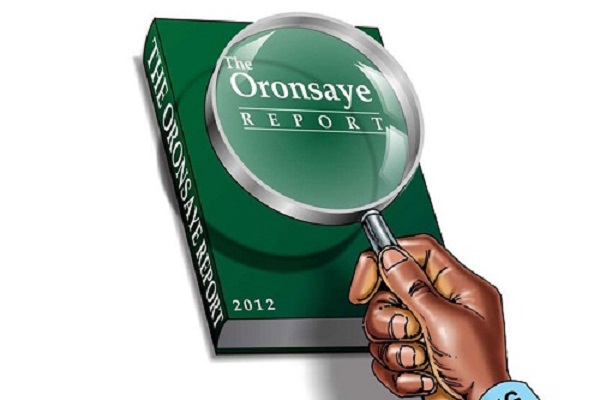The approval, by President Bola Tinubu, of the implementation of the Presidential Committee on the Rationalisation and Restructuring of Federal Government Parastatals, Commissions, and Agencies, headed by a former Head of Service of the Federation, Stephen Oronsaye, is creating ripples.
The President had announced that the implementation of the report would lead to merger of ministries and prunning of Ministries, Departments and Agencies (MDAs) from 263 to 161, among others.
Although the decision has been long-awaited, it has sparked the fear of job loss among Federal Government’s workers.
Also, the Organised Labour is afraid over the implementation of the report.
However, the Federal Government has allayed fears of job losses. It said it resolved to implement the report to pave the way for a leaner government by merging some agencies and scrapping some others.
Tinubu’s Special Adviser on Information and Strategy, Bayo Onanuga, who made this known in a post on his X handle, had explained: “Twelve years after the Steve Oronsaye Panel submitted its report on restructuring and rationalising of Federal Government’s parastatals and agencies and a White Paper issued two years after, President Tinubu and the Federal Executive Council decided to implement the report.
“Many agencies will be scrapped and many others will be merged, to pave the way to a leaner government.’’
Senior civil servants, others react
The Association of Senior Civil Servants of Nigeria (ASCSN) has thrown its weight behind the implementation of Oronsaye Report, saying there was the need to cut the cost of governance.
The union, however, cautioned against throwing out workers into the labour market.
Addressing reporters recently in Abuja, the National President of ASCSN, Comrade Tommy Okon, noted that the merger of some offices, scrapping of some and subsuming some into other MDAs was one way of cutting costs.
He said: “We have received several messages and calls from the workers and other stakeholders wanting to know if the implementation of the Oronsanye Report would affect jobs or lead to job loss. Let me use this opportunity to state that we cannot continue to do the same thing all the time and expect different results.
“As a Union, we have been on this issue of cutting the cost of governance and this has to be done holistically, taking into consideration all arms of government: the Executive, Legislative and Judiciary.
“These will be the best ways to make governance efficient, cost-effective and productive. Let me also say that being in Union does not warrant blind and thoughtless criticism. Whenever the government takes the right decision, we should agree and if need be, suggest even better ideas to move the nation forward just like what the Trade Union Congress did by forwarding 15 suggestions to Mr. President on how to get the nation out of the wood.
“The Oronsaye Report established that there are 541 Federal Government parastatals, Commissions, Agencies (Statutory and non-statutory) and recommended that 263 of the statutory agencies should be reduced to 161, while 38 agencies should be abolished and 52 merged. It also recommended that 14 of the agencies should revert to departments in ministries.
“Of the 104 MDAs, some of those to be scrapped, fused and merged include the EFCC, ICPC, CCB, NTA, NCC, PPPRA, COREN, PTAD, VON, NAHCON, and NCPC.
“We have been clamouring for government at all levels to cut the cost of governance; to us, this is one of the best ways to achieve it.
“Therefore, there is the need for the government to drastically cut the cost of governance, eliminate the overlapping of responsibilities to ensure that responsibilities are appropriately domiciled, increasing efficiency, effectiveness, increased productivity, national competitiveness and international ranking.”
While calling on Tinubu to review the report to ensure it aligns with realities, the union sought the inclusion of organised labour in the implementation of the Report to ensure credibility.
The government’s move also got the nod of the Labour Party (LP)’s presidential candidate in the last year’s general election, Mr Peter Obi, who said being in opposition did not warrant thoughtless criticism.
Cautioning the government against hasty action, he added that if well-implemented, the Oronsaye report would cut the high cost of governance, among others.
He urged the government to eliminate waste and redirect funds to education, healthcare and poverty eradication program.
A political economist, Prof. Pat Utomi, on his X handle described Tinubu’s decision as a ‘paradox ahoy’.
He suggested it would be proper if the administration could just start with trimming the cabinet.
“Paradox ahoy. The largest cabinet in Nigerian history has just voted for full implementation of the Oronsaye Report. Applause. Applause!! If we can just start with trimming the cabinet,” he said.
NLC, TUC, NASU against govt’s move
Countering the Federal Givernment, organised labour expressed outrage over Tinubu’s approval of the implementation of the Oronsaye Report on public sector reforms, saying it would lead to massive job losses, among others.
While the Nigeria Labour Congress (NLC) has directed its members in the public sector to it with impact analysis report focusing on the potential consequences, including job losses, changes in workload, pay/compensation and the impact on workers, work, and trade unions, the Trade Union Congress of Nigeria (TUC) set up a three-member committee to monitor the implementation of the report to ensure none of its members loses their job.
Already, the Non-Academic Staff of Educational and Associated Institutions (NASU) General Secretary, Comrade Peters Adeyemi, has called on Tinubu to review his stance on the report because of its members’ job, asking: “Why did you think the former governments of President Goodluck Jonathan and President Muhammadu Buhari refused to implement the Oronsaye Report? You think they are cowards?”
Information minister: govt not out to retrench workers
Speaking at the fourth Ministerial Briefing Series in Abuja, Minister of Information and National Orientation, Mohammed Idris, said: “The whole idea is that the government wants to reduce cost and improve efficiency in service delivery.
‘’It does not mean that the government is out to retrench workers or throw people into the labour market.”
Idris said the implementation of the report, which had been on the shelf for about 11 years, is a clear demonstration of President Tinubu’s commitment to fiscal prudence and responsible governance by championing a comprehensive review of government‘s commissions, agencies, and parastatals.
He said report’s approval was to ensure that essential services were not compromised and that the needs of citizens are adequately addressed.

